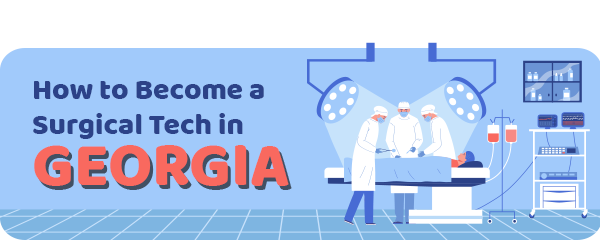In the surgical environment of Georgia, a dedicated and highly skilled team stands ready to respond promptly, especially in critical situations.
This vital team comprises various professionals, including:
- Surgeons
- Anesthesia Specialists
- Surgical Nurses
- Surgical Technicians
Their collaboration begins before a surgical procedure and extends well after its completion.
These proficient healthcare professionals may also be referred to as operating room (OR) techs and scrub techs, reflecting the diversity of their roles.
Article Table of Contents
Surgical Technologist’s Role and Responsibilities
Surgical technologists play an integral role in the surgical arena.
Their duties encompass a wide range of responsibilities, including:
- Preparing patients for surgery
- Transporting patients to and from the OR
- Preparing the OR with surgical equipment and supplies
- Monitoring the instrument count throughout surgery
- Handing the surgeon medical instruments
- Closing wounds and bandaging patients
It’s important to note that these responsibilities only scratch the surface of the extensive duties performed by these dedicated healthcare professionals.
Training and Education for Surgical Technologists
Becoming a surgical technologist in Georgia follows a well-defined path.
While they are not governed by a specific institution, aspiring surgical technologists must undergo a rigorous process to enter this profession.
The journey typically begins with a high school diploma or GED.
Subsequently, students must enroll in specialized training programs tailored to provide the necessary education and clinical experience.
These programs typically include coursework in:
- Microbiology
- Pathophysiology
- Pharmacology
- Anatomy
- Physiology
- Medical Terminology
Furthermore, students receive training in life-saving techniques, including CPR and the use of automated external defibrillators (AED).
Bevill State Community College 
It offers a program comprising 29 credit hours, covering essential areas like sterile processing, infection control, sterilization, instrumentation identification, and safety.
Specific admission requirements may vary among institutions.
In most cases, applicants are expected to possess a high school diploma or GED and may need to pass placement exams, such as the Accuplacer.
Some programs consider military service and prior medical experience, if applicable.
Health insurance is often a requirement due to the nature of the profession.
Clinical experience is a crucial component of training, involving the completion of a minimum of 120 clinical cases, including 30 in general surgery, with 20 in a first scrub role.
Furthermore, students may be required to meet specific academic criteria, such as a minimum composite score on the ACT, a Writing score on the Accuplacer, or a Math score on the Accuplacer.
Georgia boasts several institutions that offer programs designed for aspiring surgical technologists.
Albany Technical College 
Albany Technical College presents an accelerated diploma program in Surgical Technology, designed to be completed in less than a year.
This dynamic curriculum includes hands-on experience, with students participating in a total of 120 surgical cases.
As for tuition, in-state students can expect to pay $2,648 per semester, while out-of-state students would pay $4,784.
Athens Technical College 
Prospective surgical technologists can choose between a diploma program and an associate degree program.
The diploma program offers a swift path to qualification, taking just a year or less to complete.
In-state students will find the tuition cost per semester to be around $2,684, with out-of-state students paying $4,820.
Those pursuing the associate degree should anticipate a two-year journey towards their qualification.
Atlanta Technical College 
This program extends over five semesters and demands a full-time commitment from students.
The total cost for this program is approximately $8,255. The campus is situated in the vibrant city of Atlanta.
Each of these institutions provides unique paths to becoming a skilled surgical technologist, catering to a range of preferences and timelines.
Whether you seek an accelerated diploma, a flexible diploma and degree choice, or a comprehensive associate degree program, Georgia’s educational landscape offers a variety of opportunities to explore.
To earn an AAS degree, students must complete additional general education credit hours.
| School Name | Address |
|---|---|
| Albany Technical College | 1704 S Slappey Blvd, Albany, GA 31701 |
| Athens Technical College | 800 US-29, Athens, GA 30601 |
| Atlanta Technical College | 1560 Metropolitan Pkwy SW, Atlanta, GA 30310 |
| Bevill State Community College | online |
Earning a Certification as a Surgical Technologist
Although Georgia does not legally require surgical technologists to obtain certification, many employers prefer to hire certified professionals.
Aspiring surgical technologists can choose from several certifying bodies, including:
- National Surgical Assistant Association (NSAA)
- Provides the Certified Surgical Assistant (CSA) qualification
- National Board of Surgical Technology and Surgical Assisting (NBSTSA)
- Provides the Certified Surgical Technologist/Certified First Assistant credential
- National Center for Competency Training (NCCT)
- Provides the Tech in Surgery Certification
Among these, NBSTSA certification stands out for its nationwide recognition.
Testing centers for these certifications can be found in various cities across Georgia.
The certification exam typically comprises 200 questions, with a minimum of 119 correct answers required to pass.
There is an associated fee, which varies depending on membership in relevant professional organizations.
Certified surgical technologists must renew their certifications every four years.
Renewal can be achieved through two methods:
- Retaking the certification exam
- This involves repaying the associated fee
- Completing continuing education classes
- A total of 60 education credits must be earned during the renewal period
Certification renewal also necessitates the payment of a renewal fee.
Surgical Technologist Salaries
Although surgical technology may not be the most glamorous profession, it offers a respectable income for those who choose this path.
In Georgia, surgical technologists can anticipate an annual average income of $49,900.
For a more detailed overview of how salaries vary across different regions within Georgia, refer to the provided table.
Annual Salary Range:| Location | Avg. Annual Salary |
|---|---|
| Atlanta | $50,500 |
| Smyrna | $50,500 |
| Alpharetta | $50,300 |
| Woodstock | $50,200 |
| Athens | $50,200 |
| Waco | $50,200 |
| Saint George | $48,600 |
| Fargo | $48,600 |
| Tiger | $48,300 |
| Albany | $47,300 |
Regional Salary in Georgia
| Region | Employed | Avg. Annual Salary | Avg. Hourly Pay | Top 10% Annual Salary | Bottom 10% Annual Salary |
|---|---|---|---|---|---|
| Albany, GA | 70 | $57,180 | $27.49 | $84,350 | $41,170 |
| Athens-Clarke County, GA | 130 | $59,910 | $28.81 | $75,220 | $44,880 |
| Atlanta-Sandy Springs-Roswell, GA | 2,090 | $64,980 | $31.24 | $82,250 | $47,820 |
| Augusta-Richmond County, GA-SC | 290 | $58,030 | $27.90 | $73,620 | $45,280 |
| Columbus, GA-AL | 120 | $52,110 | $25.06 | $60,880 | $38,650 |
| Dalton, GA | 50 | $60,610 | $29.14 | $91,180 | $46,670 |
| Macon-Bibb County, GA | 130 | $54,490 | $26.20 | $72,080 | $43,220 |
| Rome, GA | 80 | $55,010 | $26.45 | $78,520 | $36,930 |
| Savannah, GA | 340 | $63,460 | $30.51 | $86,490 | $50,060 |
| Valdosta, GA | 40 | $46,570 | $22.39 | $56,750 | $38,270 |
| Warner Robins, GA | 40 | $51,960 | $24.98 | $62,220 | $43,560 |
* Employment conditions in your area may vary.
Frequently Asked Questions
Can a Surgical Tech From Georgia Choose a Specialty?
YES!
Just like surgeons can choose to operate on a specific body part, so can these techs.
Here are the most commonly chosen surgery niches:
- General surgery,
- Ob/gyn,
- Urology,
- Plastics,
- Neurology
Where Do Surgical Technologists from Georgia Find Work?
These technologists usually work in a hospital’s surgery wing.
Furthermore, these other places also hire such specialists:
- Children’s hospitals
- Cosmetic surgery centers
- Specialty clinics for surgical procedures
What Sills Do I Need To Work As A Surgical Tech in Georgia?
Here are the most important skills this profession requires:
- Able to work as part of a team
- Detail-oriented
- Take direction
- Understanding medical terms
- Understanding medical methodology
- Good communication skills
Read the full guide: How to Become a Surgical Technologist




